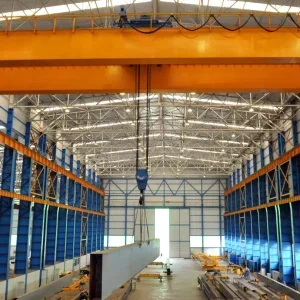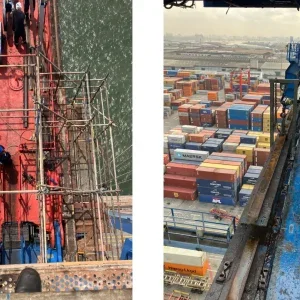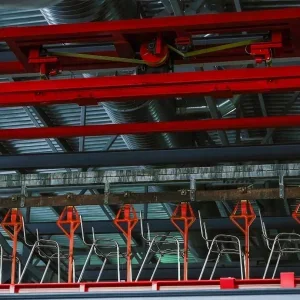A well-known name in lifting equipment circles is back in the frame in the UK. Lifting Gear Hire (LGH) re-opened for business in the UK last November, exactly 10 years after the UK arm was sold to Speedy Hire. Colin Naylor, another well-known name in the sector, is at the helm as managing director.
The original LGH was established in 1970 by Bill Parkinson, who had been working as a manager at a lifting gear merchant in Trafford Park, Greater Manchester. He had started to offer lifting gear for hire to customers whose own equipment was being repaired but the company didn’t want to enter the rental market, so Parkinson decided to strike out on his own.
His first office was in the cellar of his house and his first workshop was a small lock-up in Atherton, also in Greater Manchester. From here, LGH hired out a very similar product range to that of today—shackles, wire ropes, soft slings, hydraulic jacks, machinery moving equipment and so forth.
Managing a hire business and tracking the movement of plant assets with manual systems—such as a golf peg and pin board— was a challenge but by 1974 Parkinson had invested in an early computer system to automate invoicing. This was later bolstered by an Apple Mac II, which was used for management accounting. These systems were key in the company coping with very strong growth during the late 1970s and 80s. In 1990 the company started to establish itself in overseas markets, setting up branches in the US and in Europe. Meanwhile, it continued to grow in the UK where, by the mid-2000s, it was operating from 38 locations. However, it was at this point that the Parkinson family felt that saturation point had been reached in the UK market. Revenue was continuing to increase but margins were under sustained pressure from national hire companies that had joined the lifting gear market over the preceding decade.
With no obvious alternative strategy for the UK business and the threat of decreasing profits and company value in the future, the family sold it to Speedy Hire in 2006. The Parkinsons retained the overseas operations, which are still thriving today, and the LGH winches business was rebranded at Rotrex Group. Rotrex continues to provide winch hire to onshore and offshore markets in the UK and has recently developed into Europe—primarily Belgium and the Netherlands. It is owned by the Parkinson family but is a separate business from LGH. Colin Naylor’s first encounter with LGH was in his role as a Speedy Hire director. He had worked with independent lifting gear company Lloyds British from 1986 to 2004, at which point Speedy Hire acquired its hire division. Naylor, along with 70 colleagues, joined Speedy Hire and two years later he was instrumental in that company’s acquisition of what was then the UK’s biggest independent player in the market, LGH.
Fast forward 10 years to August 2016 and the story moves full circle. Major strategic rationalisation at Speedy Hire saw a reduction in its senior management team. Naylor was on garden leave for six months but was able to talk to the Parkinson family to assess their appetite for re-entering the market with what remained a very strong brand.
“A few months after that we made it happen,” said Naylor. “Contractually there were no restrictions on LGH re-entering the market, although Speedy did still own the LGH brand. So over the last four or five months we have negotiated with them and re-acquired the brand.”
The ‘new’ LGH is based just across the road from the original lock-up workshop of the 1970s and has a strong, experienced team behind it. This, said Naylor, is crucial in a start-up, albeit one with a familiar name and enables the company to pitch for business without undercutting on prices:
“We don’t want to be an economy discounter of these very important products. Having a great team and a great technical offer behind that substantiates our credibility.”
Along with Naylor, key team members include: commercial manager, Phil Smith (previously at Speedy); business development manager north, John Ball (previously with Gunnebo Industries, Speedy and Lloyds British); business development manager south, Gary Joyice (previously with Speedy); customer contact centre manager, Vicky Greer (previously with Speedy, Lloyds British and LGH); sales and marketing manager, Bex Widdowson (previously with Hewden); and national rental centre manager, Stuart McEwan (previously with Lloyds British Testing and Speedy). Bill Parkinson has retired and his son Ian is now chairman of the company. While the product range may be broadly similar to that offered in the early days, the business model is different.
“At its peak LGH had 38 locations in the UK and operated as a traditional multi-location hire business,” said Naylor. “Order intake and administration, along with equipment servicing and fulfilment all took place within each of those 38 locations.
“Today’s model is much more succinct and I don’t expect us to have more than seven or eight locations in the next five years. “With the technology available to us now we are able to centralise enquiry intake and order processing and as long as we get the stockholding and distribution of product right up and down the UK network we can be much more effective from a more controlled cost base.” The Manchester facility is a workshop and office environment comprising the company’s national rental centre, which is also its warehouse for the local territory, the customer contact centre, which processes orders and enquiries, and the technical support team. A warehouse in Rainham, east London opened in February and a second is due to open at a soon-to-be-revealed location in Scotland. The next warehouse on the agenda is likely to be in the Midlands.
“The warehouses will be stocked according to seasonality and appropriate to the location they serve,” said Naylor. “For example, a location in central London, which is dominated by construction activity, will have a different product mix to one in the north-east of England, which would be much more industrial—petrochem and power stations and so on. If those locations hold the most appropriate equipment we can support and feed them through the night.
“If our warehouses are located strategically we believe we can serve the majority of the UK within a four hour drive of our current and planned locations.”
LGH’s product range is divided into six categories—hoisting, pulling, jacking, rigging, material handling and safety. As well as clearly demarcating these categories, the newly launched website also features bestselling products and monthly featured products. The range of products within the individual categories are “broad and high volume” and include chain blocks, electric chain hoists, air hoists, scaffold jib hoists, safety harnesses and fall arrest tripods—to name just a very few.
The company has also launched a Technical User Guide, available in hard copy or as a digital download from the website. The 156-page guide, which has been described as “a labour of love”, allows customers to browse the full extent of LGH’s lifting equipment.
“There is a huge temptation for LGH to extend its services into testing, inspection, repair, fabrication and so on,” said Naylor. “However, our strategic intention is primarily to hire. Around 85–90% of our revenues will be from hiring equipment, with the balance made up from sales of lifting and handling equipment—products such as shackles, slings and harnesses that complement the hired equipment.
“Where opportunities present themselves for additional services it is our intention to partner with regional companies working in that space, as opposed to trying to create functions that would be non-core for us. We don’t want to be a jack-of-all-trades.” LGH is active in the offshore oil and gas and petrochemical sectors—supplying them with rigging lofts, for example—and now sees huge potential in the UK’s infrastructure sector. “Infrastructure growth, which is shaping the UK of the future, is very much where we present ourselves,” said Naylor. “The attraction is that, whether it’s Hinkley Point, HS2 or Crossrail, there is volume, longevity and it’s generally pretty safe in that it is government funded. Within infrastructure there are sub-sets of construction and elements of demolition and are all key for us. We still operate fairly heavily in the industrial market place, although we do recognise that, to a degree, it is a shrinking sector.
“Operations such as coal-fired power stations and ship-building yards are everreducing and the petrochem activity up and down the UK is a shadow of its former self. Offshore and oil and gas related activity is also in the doldrums, although this is expected to improve and we will be well placed to support the industry as it recovers. And although we recognise that these markets have weakened over the years, given the lifting challenges that present themselves in these sectors, they still remain a good opportunity for us.”
Even though the industrial sectors have diminished, Naylor said the market for lifting equipment rental has grown over the last 20 years, thanks to the aforementioned new, dynamic construction projects.
Outside of the British Isles, LGH UK is also able to operate in those countries that don’t already have an LGH presence and can share equipment with its US, Belgian, Dutch and German counterparts. Naylor sits on the group’s European operations board, which comprises the MDs of the territories, a financial lead and the chairman.
“It is more or less a supporting, collaborative role,” said Naylor. “When challenges have to be overcome, three or four heads are better than one.”






